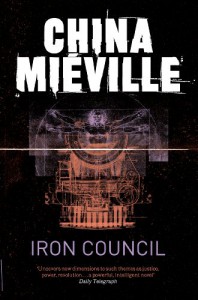Iron Council - China Mieville

Seemingly April is the Month of Disappointing Sequels.
Iron Council is the third in Mieville's Bas-Lag sequence (I hesitate to call it a series, because although I think you have to read each book to get the full effect of the next one, it doesn't follow the same characters or even the same arc, really). It's hard to say too much about the plot, because spoilers (the slow reveal of what the Iron Council is is one of the best things about the book), but it follows the course of a revolution in the repressive city-state of New Crobuzon (think Ankh-Morpork, but without the charm). Fighting in the streets, not-so-covert sedition, assassination plots, that sort of thing. Somewhere far away from the city is a thing called the Iron Council, an entity from which the revolutionaries draw hope and inspiration. And it's coming back.
Like The Scar, Iron Council avoids narratively obvious outcomes to comment on the idea of human endeavour and power, and to think about how "history" works. This is fine. This is how I like my Mieville: it probably won't suit everyone - I can imagine "what was the point of that?" as a valid response - but it makes me think. It challenges me as a fantasy reader, and I enjoy that challenge. But for me Iron Council doesn't achieve the claustrophobia or the sheer thematic density of Perdido Street Station. The relationship between Judah and Cutter is nowhere near as convincing or as emotional as that between Isaac and Lin in Perdido. The book begins slowly and not very interestingly: Mieville is far better at writing city life in its multiplicity than he is at writing about small bands of travellers alone in a vast continent.
Actually, I think that's the main issue here. Despite the revolution, Iron Council is not at its heart a book about a city, as both Perdido and The Scar were. It's a book about a concept rather than a place, about abstractions rather than the concrete. It's more interested in its themes than in its characters, which is probably not a good place for any book.
(While we're talking about characters, I just want to register my uneasiness about Mieville's female characters. Perdido and Iron Council have both featured male leads with supporting females. Though Derkhan in the former was pretty badass, Lin, the other main female character, is absent for over half the book and eventually loses her agency through spoilery means. I guess Iron Council has Ann-Hari, who is also badass, but the narrative isn't particularly interested in her and she's presented as a bit authoritarian. The Scar had Bellis Coldwine as a lead, but kind of the whole point of that book was that she didn't have any agency. Not a good trend, maybe?)
I should probably say that, on its own, Iron Council is a darn good book, actually. Thoughtful, ideas-driven fantasy with a swift and inventive plot, fascinating premise and convincing characterisation is rare enough, after all. But in the context of its predecessors it's just a bit less good.
 1
1


